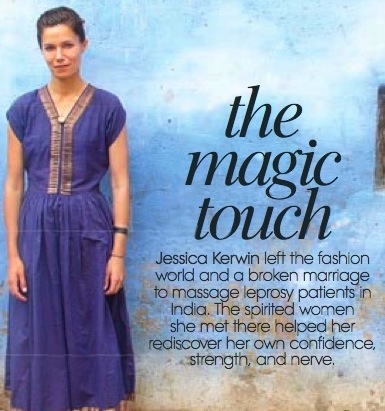 It didn't lack drama. Declaring my intention to quit Paris and the fashion world for India was a spectacular exit plan, but months before a rickety government bus dumped me in the dust near the gates of Anandwan, a leprosy treatment center in the state of Maharashtra, I used the patients there as protection, an emergency brake I'd throw anytime a conversation glided toward the breakup of my marriage and my less spectacular reasons for leaving the West. If going to India seemed like running away, enlisting for gritty volunteer work made me sound less like I was running scared. "I'm going to change bandages in a leper colony," I'd tell anyone who pressed. That's the kind of statement that steers a discussion.
It didn't lack drama. Declaring my intention to quit Paris and the fashion world for India was a spectacular exit plan, but months before a rickety government bus dumped me in the dust near the gates of Anandwan, a leprosy treatment center in the state of Maharashtra, I used the patients there as protection, an emergency brake I'd throw anytime a conversation glided toward the breakup of my marriage and my less spectacular reasons for leaving the West. If going to India seemed like running away, enlisting for gritty volunteer work made me sound less like I was running scared. "I'm going to change bandages in a leper colony," I'd tell anyone who pressed. That's the kind of statement that steers a discussion.
The plan sounded extreme, but passing a winter's worth of gray days alone in Paris was unthinkable. As we sat in his office on the first day of New York Fashion Week, I delivered the bandage line to my editor, quitting my job after more than a decade as a fashion journalist. He was stunned. He giggled. "What can I say—Karl Lagerfeld needs you?" He sent me off with his blessing.
Friends told me I was brave. I bought a giant world map and nailed it roughly into the walls of my apartment. I never looked up leprosy on the Internet, never did research that could have weakened my resolve, and never admitted to a vision of India beyond Bollywood fantasy. Jaipur, Rishikesh, Benares—the words spun magic, twinkling oases vast enough to absorb the darkness of divorce, my fears of romantic failure, the guilt that came with skipping out while my husband stayed behind. It never occurred to me to go anywhere besides India, which is what happens, I guess, when you reach wit's end.
Boiled down, the facts of our breakup—two people who had simply, frustratingly, grown apart—felt too dull to describe this blunt pain I couldn't quite face. Our busyness had driven in the wedge, luring us in opposite directions while too many things were left unsaid. There were endless houseguests, constant deadlines, a thousand distractions that allowed us to avoid resolving the small problems. And naturally they grew larger. We each spent more time away from the apartment—me taking on more assignments, enrolling in a meditation course, staying out late with friends; him searching for adventure, in Hong Kong, then in Brazil. But we were still friends. We never had that knockdown fight. We dodged it, and with India as part of the deal, the terms of the breakup were vague. Divvying up the DVDs didn't happen. In our last days, instead of rehashing what went wrong, remembering the good times, we speculated about my trip, where I'd go, and what I might see. He acted as excited as I did, and that made everything easy. It was over—that was clear—but it felt like I was going on vacation. "You should be able to lift it," he said, eyeing the behemoth backpack on wheels that I had packed and meticulously repacked but never once dared pick up. I could get the thing about two inches off the ground. Which was probably just enough.
In Jaipur I swooned through the exotic haze. I found a great tailor, by trial and error, and shopped for gems and gold in the labyrinthine market stalls. At the hotel, one of the city's crumbling havelis, I played Indo-Eloise, swaddled in spangled scarves, my eyes lined with kohl, and practiced my first words of Hindi on the hotel's waiters. Lying on my bed, I slid off my wedding band and stared at my naked hand silhouetted against the ceiling. Then I dropped the ring into a satin pouch at the bottom of my suitcase. I felt good. Free. At a Cartier dinner held at the fabled City Palace one night, I found myself sipping champagne in a grand courtyard while a troupe of painted elephants paraded past.
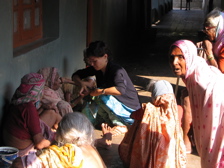 Reality didn't set in until weeks later at Anandwan, when, touring the spartan medical clinic, I was led into a bright room where a young Indian assistant prepared to wrap a patient's mutilated foot. I couldn't say now whether the patient was a man or woman, young or old. All I saw was a ripe, raw wound like nothing I'd ever witnessed—missing toes and open, red flesh, like the essence of pain. I went weak in the knees, made for the door, and held my tears until I was just outside it. India was supposed to obliterate the past, yet in Anandwan I found I'd have to confront it—one way or another.
Reality didn't set in until weeks later at Anandwan, when, touring the spartan medical clinic, I was led into a bright room where a young Indian assistant prepared to wrap a patient's mutilated foot. I couldn't say now whether the patient was a man or woman, young or old. All I saw was a ripe, raw wound like nothing I'd ever witnessed—missing toes and open, red flesh, like the essence of pain. I went weak in the knees, made for the door, and held my tears until I was just outside it. India was supposed to obliterate the past, yet in Anandwan I found I'd have to confront it—one way or another.
But not in the medical ward. I wasn't tough enough for that. Still, there were other ways I could help out in the village: doing art projects with children at a school for the deaf and blind; chopping vegetables in the communal kitchen; weeding the gardens. Or giving massages to the elderly women in the old-age home. Frivolity, femininity, and a good rubdown: I signed up.
As we ate dinner that night, the volunteers, all Westerners with the aid organization Sanghaseva, talked about the work we'd chosen to do. What massage experience did I have? Well, actually none, but I figured I had booked enough spa days and unkinked enough of other people's sore shoulders to qualify with a group of old women many in Indian society still consider untouchable. At the general store outside the village gates I bought a big bottle of Ayurvedic massage oil—thick, sticky, and pink. I put on a silk dress I'd ordered in Jaipur, new dangling gold earrings, and set out.
Inside the sunny central courtyard at the women's quarters I met bedlam. The previous year, another pair of volunteers had massaged the 80 or so patients living there, and the ladies were ready for more. Almost before I could say mylese, "massage"—one of my five words in the local dialect, Marathi—they had me surrounded. I nervously picked my first client at random and sat her down on a bench. I smiled, greased up with the syrupy oil, and took her gnarled, fingerless hand, all stiff knobs and thin bones, between my slick palms. She watched with bright-eyed amazement. We both did.
 Doctors still don't know how the bacteria that causes leprosy is transmitted (though they do know it would be virtually impossible for a healthy Westerner to catch the disease, which, once detected, is cured with the first dose of antibiotics). In India, where leprosy can go hidden or undiagnosed, the disease is known for its all-too-obvious symptoms, which include severe disfigurement: the missing digits, withered limbs, sunken noses—all the result of deadened nerves. When a patient gets a thorn in his or her foot or burns a finger, it isn't felt. The wound gets infected, and this secondary infection spreads down to the bone, which necessitates amputation. But while the physical results are harrowing, in India the ramifications of social stigmas are just as brutal. Baba Amte, a wealthy local aristocrat turned social activist and a onetime Gandhi cohort, founded Anandwan in 1951, giving patients banished from their villages a home. At 92 Amte is considered a living saint by the hundreds who visit each year, waiting for him to roll down the main street, waving hello from his hospital bed on wheels.
Doctors still don't know how the bacteria that causes leprosy is transmitted (though they do know it would be virtually impossible for a healthy Westerner to catch the disease, which, once detected, is cured with the first dose of antibiotics). In India, where leprosy can go hidden or undiagnosed, the disease is known for its all-too-obvious symptoms, which include severe disfigurement: the missing digits, withered limbs, sunken noses—all the result of deadened nerves. When a patient gets a thorn in his or her foot or burns a finger, it isn't felt. The wound gets infected, and this secondary infection spreads down to the bone, which necessitates amputation. But while the physical results are harrowing, in India the ramifications of social stigmas are just as brutal. Baba Amte, a wealthy local aristocrat turned social activist and a onetime Gandhi cohort, founded Anandwan in 1951, giving patients banished from their villages a home. At 92 Amte is considered a living saint by the hundreds who visit each year, waiting for him to roll down the main street, waving hello from his hospital bed on wheels.
Of course, not all Anandwan residents are saintly. "Lord of the Flies in the massage parlor," I wrote in my journal that first week. They looked like sweet little old ladies, with their puckered faces and shining eyes, but these women were tough. At top volume they scolded me when they thought I was wasting time with someone unworthy. In the midst of the chaos, I could never remember whom I'd promised to massage next, not that the women ever formed a real line. The strong bullied the weak, nimbly unwrapping their saris with stump fingers, then shoving their half-stripped bodies toward me.
The women who had just been massaged by another volunteer, my beautiful British co-worker Hannah, came to me next, lying, insisting with sorrowful faces that they hadn't had a turn, though their skin was buffed up to a high shine. And they all, each one of them, demanded more oil, daily, spending the morning rubbing it into their powdery skin even after a long massage. 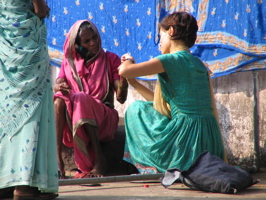
Whenever I wasn't paying attention the cheekiest of the residents snuck up behind me and stole the bottle, pouring out as much as they dared to keep for themselves. Those who were bedridden called to me as I passed in the corridor, "Hey, bai!" ("Hey, sister"), holding out a chipped bottle or a tiny plastic jar in desperation. One woman, who was unable to walk, scooted through the house over the concrete floor with a burlap rice sack under her bum until she found me. She, too, needed oil. No matter how much I poured, it was never enough. The women complained, shaking their heads, trying to reason with me. I made a game of it, shrieking with mock pain as oil dripped from the bottle and promising to give a little more tomorrow.
Their thirst was insatiable. There had been a drought. Most of these women, some well into their 70s, had barely been touched, except to be bandaged, since leaving home decades ago. I started with their clawed hands and moved to their stone-cold feet. The bold let me work on their soft shoulders, their aching hips. Some women had hefty, scarred hands that bore witness to their years working the fields. Others seemed as brittle as antique dolls, with wrists as thin as broom handles, shins as narrow as my wrists, thighs the size of my calves, rib cages like children's. Most went stiff at the first touch, tension racing through their limbs, and relaxed slowly, over weeks. Still, while tears traveled down the cheeks of one wrinkled granny, another slapped my shoulders, pointing to her crooked back, eager to tell me about her dukhane, her "pain." A third liked to get my attention by pulling my ears.
I lost my cool once or twice. One morning, during a long stint of back-to-back massages, I felt a sharp tug and heard the stitching of my dress come undone at the waist—pop, pop, pop. A woman sat underfoot, grimacing and shrieking, clenching my hem in one hand and holding the other palm outstretched, demanding—what else?—oil. "Fine!" I huffed, angrily overpouring until it oozed from between her stiff fingers. "Happy?" She moaned over the pink puddle, trying to scoop up the excess from the floor. I caught my breath and walked out of the house and into the sun.
Otherwise, I did all I could to try to stay tender and to get the women to realize I wasn't a giant pale toy or a tireless massage machine. The only question they were interested in, as was the case everywhere else in India, was whether I was married. Back in Jaipur I'd been gamely practicing, telling anyone who asked that I was unmarried. It was a thrill. "Unmarried" sounded fresh, like my marriage had never happened. I began to get used to it. But in Anandwan the question finally hit deep. "Husband, bai?" the women asked, clustered around me, curious. "Yes!" I was shocked to hear myself say. "Husband, yes!" Trying to discuss the failure of my marriage with the elderly women of a traditional Indian village, where divorce is taboo, would have created insurmountable cross-cultural confusion, but I wanted them to know that I also had loved and had suffered. If they called themselves married, then so would I.
I proceeded with an elaborate pantomime, getting across that my engagement ring—which I hadn't taken off yet—was a wedding ring. I lied, pantomiming a man, my husband, tapping his foot, peering off into the distance, anxiously waiting for me. I pumped my arms and grinned over my shoulder, showing I had run away to India. We looked at one another. Deep down I think they knew I was bluffing. They squinted at the ring, unimpressed, suspicious. Still, most of these women, who wore bangles, bindis, and necklaces, all the trappings of marriage and motherhood, had been sent away in disgrace when they were first diagnosed with leprosy. Many had never seen their children or their husbands again. What did it mean when they asked if I was married? My own recently single status, of which I had been so giddily sure, suddenly turned shaky. Was I married? Technically, yes,—I hadn't signed the divorce papers yet.
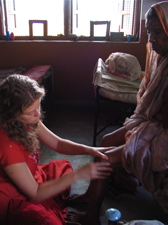 When came the inevitable question about how many children I had. "No problem—later," I told them in Hindi, like I hadn't a care in the world. "Later is OK." Later was far from OK, which they knew from one glance at my wincing face. In Paris, caught up in the day to day, I'd postponed motherhood for convenience' sake. But when was "later" now?
When came the inevitable question about how many children I had. "No problem—later," I told them in Hindi, like I hadn't a care in the world. "Later is OK." Later was far from OK, which they knew from one glance at my wincing face. In Paris, caught up in the day to day, I'd postponed motherhood for convenience' sake. But when was "later" now?
For the first time since I'd left home, this inner confusion cracked the numbness I'd built up to buffer myself from the breakup—with my big trip to India, my reputed bravery. The moment gave way to something piercing—and more real. Like these women, I was in limbo, and it hurt. Admitting to that felt true. I had shied away from the obvious terrors of bandage detail that first day, but everything I feared most was right in front of me: being old, sick, abandoned, childless, poor. By choice I was jobless, husbandless, and homeless. But the women of that house—with their theatrical, precious, mischievous lust for life—showed me how to handle it. They were anything but numb. They were alive, through their relentless pursuit of soft skin, and even through their pain. Mandura, one of the youngest and the fiercest in the house, walked to her bed and came back smiling. She pressed a deep red bindi onto my forehead. Now at least I looked respectable.
The four dormitory rooms that made up the women's quarters were overwhelmingly intimate, with each bed arranged inches from its neighbor. The noise, the action, was constant—shouting, singing, pots clanging from the kitchen, the endless washing up. In the beginning I was stunned by this vision of what I'd been taught poverty looked like. I could sit rubbing a withered foot while making lists in my head of things to have sent over from home—bedding, sweaters, good creams for the ladies' cracked skin. There were lists of people who might give money to Anandwan, lists of creative fund-raising ideas.
But the house seemed less unruly as I understood its daily rhythm, the poverty less acute as I became more comfortable there. I dropped the list-making and focused on small, useful gifts I could find in the crossroads. A fresh length of hair ribbon. A little bottle of lamp oil. A new sari to replace the one that had gone threadbare. I learned the word mausie, "auntie," a term of respect.
Instead of a voracious pack, the women became individuals to me. I hung Sudana's just-washed saris on the line to dry. I sat on Sita's quiet bed near the window, watching the world go by. I marveled as Kosobai took down her long braids to brush out her waist-length white hair. One morning she lit a small oil lamp, then turned to face a tea packet printed with an image of Vishnu that was pinned to the shelf above. She circled the flame twice around the crinkled plastic deity. Eyes closed, whispering her prayers, she motioned for me to do the same. And almost every day another woman sat me down and, holding my hand, told me the story of her life—in Marathi—dabbing at the tears with her sari during the chapters of lost love and beaming through the chapters of bliss. I couldn't understand a word, but I knew just what she meant.
And I played lazy to stem the relentless demand for massage, yawning and stretching after my first few clients, then passing time with the women who took the sun just outside the front door, these days with their saris slightly hiked, stroking the oil onto their legs with surprising gentleness. Likewise, I worked slowly through my rounds, relishing the sometimes beautiful sculpture of their twisted limbs, their faded traditional tattoos, inky images of sacred Tulsi plants that bloomed along their forearms or on the backs of their knuckles. In the meantime, the women began to shine, literally, their once dusty, dry skin turning glossy during those weeks of constant oiling.
During one of our evening discussions, a fellow volunteer asked what it all meant. "Does it really 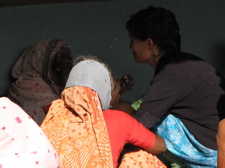 make a difference, coming here, giving massages, then leaving?" Maybe it wasn't a big humanitarian statement. But while anyone would welcome a few weeks of free massage, I'm sure I got the better end of that deal. The dauntless women I met in Anandwan gave me the nerve to lay aside my traveler's bravado and to look instead at what it really means to be strong, to face the truth, to leave home. Of course, finding myself playing amateur masseuse in central India also reminded me that life is full of surprises, and realizing that delight helped me contemplate my upcoming return to Europe and an uncertain future. What I would work at, even whether I would stay in France or return to my native United States, were questions I hadn't resolved. Sometimes that drift seemed frightening, but conceding that I had no idea what would happen next was also something I now felt equipped to deal with.
make a difference, coming here, giving massages, then leaving?" Maybe it wasn't a big humanitarian statement. But while anyone would welcome a few weeks of free massage, I'm sure I got the better end of that deal. The dauntless women I met in Anandwan gave me the nerve to lay aside my traveler's bravado and to look instead at what it really means to be strong, to face the truth, to leave home. Of course, finding myself playing amateur masseuse in central India also reminded me that life is full of surprises, and realizing that delight helped me contemplate my upcoming return to Europe and an uncertain future. What I would work at, even whether I would stay in France or return to my native United States, were questions I hadn't resolved. Sometimes that drift seemed frightening, but conceding that I had no idea what would happen next was also something I now felt equipped to deal with.
I went to town to buy a couple of kilos of milky Indian sweets the day before I left them. I was the big customer of the afternoon. "How many children?" asked the man behind the counter, imagining I must have plenty of mouths to feed. "No children," I told him, smiling. "A hundred mausies."
One taste and the women were up to their old tricks, lying, telling me that they hadn't been given any sweets yet, or asking for a second piece for a friend who wasn't around. One woman earnestly explained she needed a second candy for her pet parrot. And when I caught them and howled, lifting the box out of reach, they laughed. For a Westerner, maybe I wasn't so hopeless after all. I took out one last big bottle of oil and poured it around until it was empty. When I had set out I thought I'd go to Anandwan to help the sick. But my preconceived idea about who would give help and who would receive it had been turned on its head. Now I felt light, ready, and it had nothing to do with the trumped-up courage that got me out of Paris. I could face almost anything—even India's crazed rickshaw drivers, waiting just beyond the village gates.
We stood together in the courtyard lingering over goodbye, like friends parting after some wild road trip. "You come back," said Laxmi, a tough villager with thick tattooed forearms and a beautiful singing voice. She pantomimed how she would gently rock a baby. "You come back in one year with one son."
Jessica Kerwin